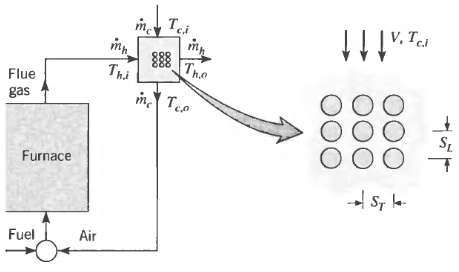Question: A re-cooperator is a heat exchanger that heats the air used in a combustion process by extracting energy from the products of combustion (the flue
A re-cooperator is a heat exchanger that heats the air used in a combustion process by extracting energy from the products of combustion (the flue gas). Consider using a single-pass, cross-flow heat exchanger as a re-cooperator. Eighty (80) silicon carbide ceramic tubes (k = 20 W/m ? K) of inner and outer diameters equal to 55 and 80 mm, respectively, and of length L = 1.4 mare arranged as an aligned tube bank of longitudinal and transverse pitches SL = 100 mm and ST = 120 mm, respectively. Cold air is in cross flow over the tube bank with upstream conditions of V = 1 m/s and Tc,i = 300 K, while hot flue gases of inlet temperature Th,i = ] 400 K pass through the tubes. The tube outer surface is clean, while the inner surface is characterized by a fouling factor of R''f = 2 X 10?4 m2 ? K/W. The air and flue gas flow rates are mc = 1.0 kg/s and mh = 1.05 kg/s, respectively. As first approximations, (1) evaluate all required air properties at 1 atm and 300 K, (2) assume the flue gas to have the properties of air at 1 atm and 1400 K, and (3) assume the tube wall temperature to be at 800 K for the purpose of treating the effect of variable properties on convection heat transfer.
(a) If there is a 1% fuel savings associated with each 10?C increase in the temperature of the combustion air (Tc,o) above 300 K, what is the percentage fuel savings for the prescribed conditions?
(b) The performance of the re-cooperator is strongly influenced by the product of the overall heat transfer coefficient and the total surface area, UA. Compute and plot Tc,o and the percentage fuel savings as a function of UA for 300 UA 600 W/K. Without changing the flow rates, what measures may be taken to increase UA?

m Tei |V, Te. The Th Flue gas SL 000 Furnace Air Fuel
Step by Step Solution
3.39 Rating (174 Votes )
There are 3 Steps involved in it
KNOWN Dimensions configuration and material of a singlepass crossflow heat exchanger Inlet conditions of inner and outer flow Fouling factor of inner ... View full answer

Get step-by-step solutions from verified subject matter experts
Document Format (1 attachment)
8-E-M-E-H-M-T (1058).docx
120 KBs Word File


